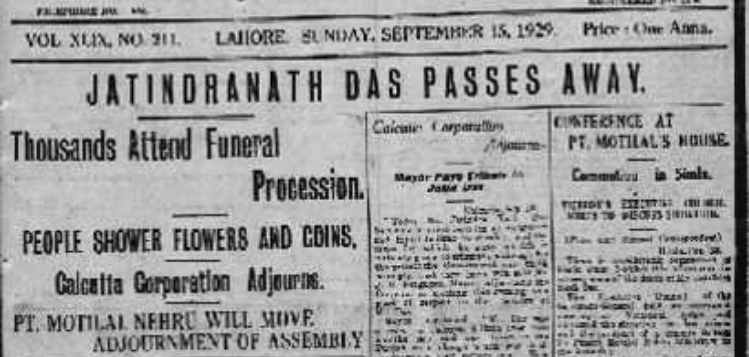_(1).webp)
Saquib Salim
“The charge is that the Government has stood still while human life was ebbing away, that they were not taking the steps which it was their very clear duty to take. Sir, I gave the history of this hunger-strike earlier in the morning. The hunger strike began in the middle of June, and Jatindra Das died on the 61st, (An Honourable Member: 63rd), on the 63rd day of the strike. For days and days, the news came that his life was ebbing away, that at any moment he might breathe his last, the news came that there were other hunger strikers who were in a very precarious condition, and what was the Government doing all this time? It is said, Sir, that Nero fiddled while Rome was burning. Our benign Government has gone one better than Nero.”
A Slice of History
These are the remarks of Pandit Motilal Nehru in the Legislative Assembly on 14 September 1929, a day after Jatindra Nath Das died. He passed away after his 63-day hunger strike against the inhuman conditions in which Indian Freedom Fighters were lodged in jails by the British Government.
Jatindra Nath Das and many other revolutionaries lodged in different jails had gone on a hunger strike in July 1929 to protest against the appalling conditions of the jail. Das was in the Lahore jail. Bhagat Singh was also in the same jail and he too was on hunger strike.
In a letter dated 28 January 1930 to the government, Bhagat Singh and his comrades wrote, “Among others, Sardar Kabul Singh and Sardar Gopal Singh confined in Mianwali Jail, Master Mota Singh confined in Rawalpindi jail have also been awarded vindictive punishment for joining the general hunger strike. In most of these cases, the periods of imprisonment have been enhanced while some of them have been even removed from the Special Class.
"Hunger strike Messrs. Jachindra Nath Sanyal, Ram Kishan Khattri, and Suresh Chandra Bhattacharya confined in Agra Central Jail, Raj Kumar Sinha, Sachindra Nath Bukshi, Monmotho Nath Gupta and several other Kakori case prisoners have been severely punished. It is reliably learnt that Mr. Sanyal was given bar-fetters and solitary cell-confinement and as a consequence, there has been a breakdown in his health. His weight has gone down by eighteen pounds. Mr. Bhattacharya is reported to be suffering from tuberculosis. The three Bareilly Jail prisoners also have been punished. It is learnt that all their privileges have been withdrawn.”
The British Government tried to force-feed Jatin which caused internal injuries to him. Nothing, however, could break his resolve. The injuries resulted in serious health issues and his condition deteriorated. On 13 September he passed away and, amazingly, leaving Indians charged with fresh energy to take on the British.

Newspapers carrying report on death of Jatinder Nath Das
Subhas Chandra Bose arranged for his mortal remains to be brought to Kolkata from Lahore for cremation. Famous revolutionary Durga Bhabhi led this funeral procession. From Lahore, his body was carried to Kolkata in a train, which became a pilgrim centre of sorts. Wherever it passed people would throng in thousands to have a darshan of Jatin’s body.
In Kanpur Ganesh Shankar Vidyarthi and Jawaharlal Nehru welcomed the train. In Kolkata Subhas Chandra Bose led a huge crowd to receive Jatin's mortal remains.
Jatin’s martyrdom rocked the Legislative Assembly as well. Revolutionaries from different countries sent their condolence messages. Subhas made it a point to rally people against the British rule in India.
Pandit Madan Mohan Malviya declared in the Legislative Assembly, “They are, every one of them, persons who are inspired by a high sense of patriotism and a burning desire for the freedom of their country.”
Amar Nath Dutt of Burdwan told the Assembly, “Sir, I charge the Government with the murder of Jatindranath Das, who laid down his life to vindicate the elementary right of political prisoners in India. The government knows of what material these young men are composed of.” He concluded his speech passionately forecasting the end of British rule in India.
Amar Nath said, “But, Sir, it is useless for us to point out the path they (British Government) should follow in such cases, because I know that they will not follow the righteous path, for robbers and freebooters do not do so, neither do murderers. I only remind them. In the words of one of their poets which I read when I was a boy of eight or ten, with a slight variation: England shall perish, write that word in the blood she has spilt; Perish hopeless and abhorred, Deep in ruin as in guilt. And I beg to conclude with the prophetic words of our poet, Rabindranath:
Bhojha ter bhari hele, Dubbe tarikhan (The vessel will sink when a load of sin is great.) Let me tell you to your face that you are destined to be drowned for sins of omission and commission and "tor dhwaja dhulae lutoe (Thy flag will be laid in the dust.)"
Bhagat Singh and his comrades warned the British Government, "Let us at the same time point out that India can produce many more Jatins and Warias, Ram Rakshas and Bhan Singhs. (The last two named laid down their lives in the Andamans in 1917- the first breathed his last after 92 days hunger-strike while the other died a great hero after silently undergoing inhuman tortures for a full six months).”
ALSO READ: Haji Imdadullah: another forgotten hero of 1857
Martyrdom of Jatin worked as a catalyst for Indian nationalism and on its platform Mahatma Gandhi launched a Civil Disobedience Movement.
